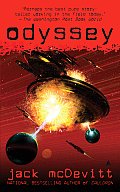
| Series: | Academy #5 |
| Publisher: | Ace |
| Copyright: | November 2006 |
| Printing: | November 2007 |
| ISBN: | 0-441-01540-9 |
| Format: | Mass market |
| Pages: | 423 |
Odyssey is the fifth book in the Academy (or Priscilla Hutchins) series, which started with The Engines of God, but like many of the books in this series it can be read independently. One will miss the numerous references to previous events in the history of space exploration, but none of them are horribly important for following the plot. That unfortunately also means that it's not a direct sequel to Omega and doesn't advance the plot of the Omega clouds, which I found frustrating.
It's becoming harder and harder to maintain funding for deep space exploration as humanity turns inward to deal with serious environmental problems at home. The Academy is short on ships and funds for routine maintenance, and an increasing amount of space travel is tourism instead. But that might change when a group of spheres, maneuvering in formation, are spotted outside a tourist ship. There had been scattered reports of so-called "moonriders" before (the future version of UFOs), but now the sightings start coming fast and frequent. And then become ominous, as they apparently redirect an asteroid into a collision course with a virgin world with unicellular life.
Odyssey is partly a puzzle, and features a few of the tense rescue scenes from previous books in the series, but it's mostly a book about personalities and politics, about character interactions and debates during the investigation of what the moonriders are and what to do about them. Hutchins continues to be Director of Operations for the Academy and doesn't go into space. Those who do go into space and do most of the on-the-scene investigation are an odd (and political) mix, one of whom is the egotistical and contrarian editor Gregory MacAllister who played a prominant role in Deepsix. This is both a feature and a bug: any story benefits from an irascible cynic, but I find MacAllister wears on me at length. He works better for me in small doses rather than as a primary character.
McDevitt continues to write stories with a different pacing and different focus than any other space-focused SF that I've read. Most of the Academy missions, and one of the centerpieces of this plot, are science missions of various kinds, and the politics are a mix of academic and government politics of the sort that one gets near the top of government-funded basic science entities. The poster child for SF about scientists doing science is Gregory Benford's Timescape, which I didn't care for. I understand the appeal much better in the hands of McDevitt. It's a refreshing breath of air to have science be uncertain and slow, to have characters behave with both personal and institutional caution instead of rushing into the plot, and to have a story full of false starts and abandoned theories like actual science. It makes for slow pacing and a far stronger focus on personalities, but if you've read much of McDevitt, you already know whether you enjoy that or not.
The one caveat that I'll add is that, despite some well-handled twists and a truly excellent set piece, I found the ending rather disappointing. I came away from the book with a feeling of station-keeping, of little or no real progress in understanding the universe and without any dramatic changes to the situation in which the book started. There seemed to be less plot and less substance to this book than in the previous books of the series, despite being of the same length. I know this isn't a universal problem — my mother liked this book just fine — but I wanted a bit more revelation at the end than we get. This is becoming an ongoing problem with this series, and I suspect I'm looking for a different story than the one McDevitt wants to tell.
I think this is one of the weaker books in the Academy series, but opinions will differ depending on how much you like the characters. (If, for example, you like MacAllister more than I do, you'll probably enjoy it more.) If you've been enjoying the series, this is more of the same and therefore probably worth reading. But don't expect it to be as good as Chindi, which is still the high point.
Followed by Cauldron.
Reviewed: 2012-04-29